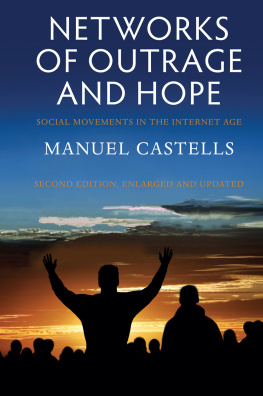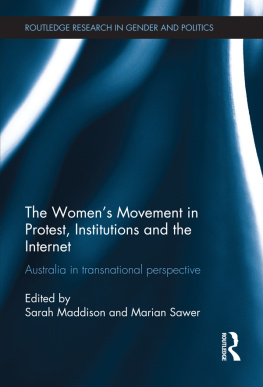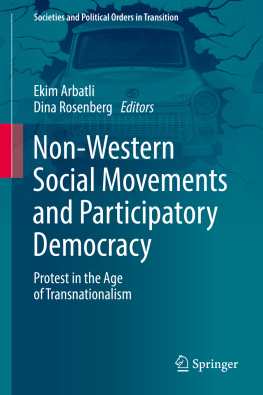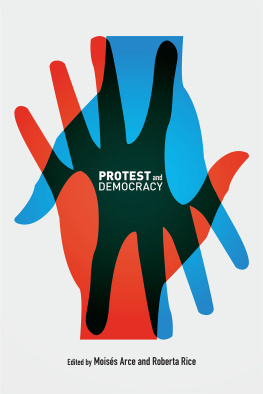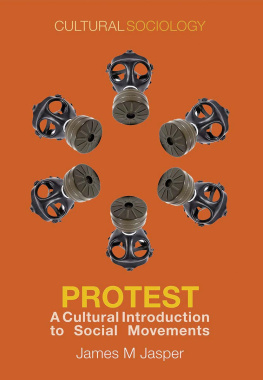Contents
Guide
Print Page Numbers

Pour Alain Touraine
My intellectual father, theorist of social movements
NETWORKS OF OUTRAGE AND HOPE
SOCIAL MOVEMENTS IN THE INTERNET AGE
SECOND EDITION
MANUEL CASTELLS
polity
Copyright Manuel Castells 2012, 2015
The right of Manuel Castells to be identified as Author of this Work has been asserted in accordance with the UK Copyright, Designs and Patents Act 1988.
First published in 2012 by Polity Press
This edition first published in 2015 by Polity Press
Polity Press
65 Bridge Street
Cambridge CB2 1UR, UK
Polity Press
350 Main Street
Malden, MA 02148, USA
All rights reserved. Except for the quotation of short passages for the purpose of criticism and review, no part of this publication may be reproduced, stored in a retrieval system, or transmitted, in any form or by any means, electronic, mechanical, photocopying, recording or otherwise, without the prior permission of the publisher.
ISBN-13: 978-0-7456-9579-2
A catalogue record for this book is available from the British Library.
Library of Congress Cataloging-in-Publication Data
Castells, Manuel, 1942Networks of outrage and hope : social movements in the Internet age/Manuel Castells.
pages cm
Revised edition of the authors Networks of outrage and hope published in 2012.
ISBN 978-0-7456-9575-4 (hardback) -- ISBN 978-0-7456-9576-1 (pbk.)
1. Information technology--Social aspects. 2. Internet--Social aspects. 3. Information society. 4. Information networks. 5. Social movements. 6. Technology and civilization.
I. Title.
HM851.C369 2015
302.231--dc23
2014043395
The publisher has used its best endeavours to ensure that the URLs for external websites referred to in this book are correct and active at the time of going to press.
However, the publisher has no responsibility for the websites and can make no guarantee that a site will remain live or that the content is or will remain appropriate.
Every effort has been made to trace all copyright holders, but if any have been inadvertently overlooked the publisher will be pleased to include any necessary credits in any subsequent reprint or edition.
For further information on Polity, visit our website:
politybooks.com
PREFACE 2015
So Paulo, June 14, 2013. I had just finished my lecture presenting the first edition of the book you have in your hands before an audience of several hundred people. The first question that opened the subsequent discussion came from one of the many journalists present in the auditorium, Why do you think these kinds of movements do not happen in Brazil? Before I could improvise a sophisticated theory about Brazilian exceptionalism, someone in the room shouted We cannot get out! The Avenida Paulista is blocked! Indeed, the Movimiento do Passe Livre had taken its protest to the streets. The movement would go on for weeks, then for months in a very similar form to the networked social movements that had taken place in 201011 elsewhere, as analyzed in this volume. Indeed, Brazil was not an exception, but an addition to an expanding galaxy of new forms of social movements. Then came Gezi Park in Istanbul, the occupation of Maidan Square in Kiev, Hong Kongs Umbrella Revolution, Mexicans mobilization against the assassinations of the narco-state, and a multiplicity of less known protests that seem to give credibility to the main proposition of this book: that networked social movements, as identified and analyzed in the research presented here, may well be the social movements characteristic of the network society, the social structure of the Information Age.
However, the recurrence of these movements around the world at an accelerated pace is not a good enough reason to revise substantially in December 2014 a book that was finished in June 2012; because I am not in the trade of updating information a book at a time in the age of the Internet and instant communication of any relevant information. Yes, the reader will find in this expanded second edition a number of accounts of networked social movements that were not included in the first edition for the simple reason that they had not yet happened at the time of my research. But rather than compiling new information, the purpose of these empirical reports is to enrich the analytical interpretation of the form and meaning of networked social movements beyond the specific contexts where they originated in 201011. Thus, the verification of the persistence of certain key features as common to most movements in spite of the differences of contexts, goals, and demands appears to lend some explanatory value to the synthetic characterization presented in this volume; a characterization that reproduces most of the grounded theory I proposed in the first edition of this book.
Furthermore, with the hindsight of time, I have been able to examine the fundamental question that most observers addressed to these movements: So what?! What are the specific outcomes of the movements in tangible social terms? And particularly, what is their impact on the political system and on policy making, if any? By broadening the scope of the observation and by analyzing the evolution of the movements over a longer time span, I am now able to venture a number of hypotheses on the relationship between networked social movements and political change. Moreover, I have been able to introduce a fundamental distinction between networked social movements and populist reactions, of diverse ideological nature, prompted by the ubiquitous crisis of political legitimacy in a time of crisis and change at the global level. Thus, there are two entirely new chapters in this volume. One chapter focuses on an analytical commentary on a number of important social movements not present in the first edition: in Brazil, Turkey, Mexico, Chile, as well as on the anti-establishment political reactions in Europe and the United States. Another new chapter considers the relationship between different social movements and political change, including the attempt by some of the movements, for instance in Spain, to be involved in institutional politics while pursuing a transformative strategy. Yet, I decided not to change the text of the case studies that formed the basis of the first edition since the social movements I analyzed will stand in history by the practices they enacted, not by a reconstructed logic that I would add ex post. I simply have included a few comments to explain the relative fading of the Icelandic revolution, and a few others to put into perspective the dramatic turn of events in the Arab world as the result of geopolitical interventions in the space opened by the overthrowing of dictatorships by social movements. To limit the size of the book in its second incarnation, I have deleted most of the appendices to the chapter case studies, including chronologies of the movements and relevant statistical material. The interested reader can find this information in the first edition of the book.
Ultimately, what this new edition tries to achieve is to further the debate on the meaning and prospects of networked social movements; broadening and deepening the observation as much as possible in the hope that researchers, activists, and action researchers will investigate, in real time, the practices that are shaping the twenty-first-century societies around the world.
In pursuing this effort of observation and analysis of networked social movements, I have continued to rely on friends and colleagues, many of them social activists and participants in the movements. I want to personalize my gratitude and acknowledge their essential contribution to Arnau Monterde and Javier Toret in Barcelona, Joan Donovan in Los Angeles, Marcelo Branco in Porto Alegre, Gustavo Cardoso in Lisbon, Sasha Costanza-Chock in Boston, Birgan Gokmenoglu in Istanbul, Fernando Calderon in Buenos Aires/Santiago de Chile, and Andrea Apolaro in Montevideo. I am particularly grateful to the Redes Frente Amplistas of Uruguay for their invitation to participate in the First Latin American meeting of networked social movements in Montevideo in June 2013. The discussions in that meeting have been a source of ideas that have informed my reflection on social movements as presented in this volume. I have also benefited from my participation in several international meetings organized in Barcelona by the Research Group on Communication and Civil Society, Internet Interdisciplinary Institute, Open University of Catalonia. I want to acknowledge the Foundation Frontiers of the Mind, of Porto Alegre, for its invitation to Brazil in 2013, and for organizing a series of most interesting debates that informed my understanding of the Brazilian movement.

